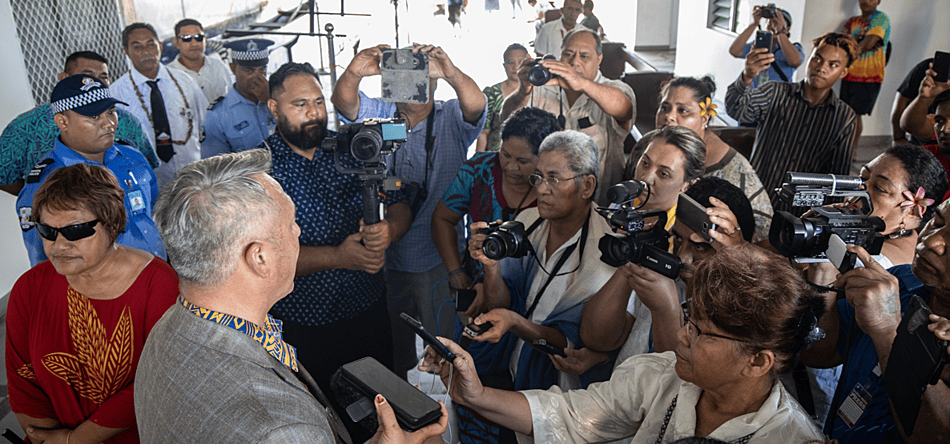Samoa has jumped into the top 20 in the latest press freedom index released by the global group Reporters Without Borders out of 180 countries and territories assessed.
It is one of only two Pacific nations in the top 20 of the index with New Zealand the other state and ahead of Samoa in 13th position. The other Pacific states below Aotearoa and Samoa include Australia (27), Tonga (44), Papua New Guinea (59), and Fiji (89).
Launching its Freedom of the Press Worldwide 2023 report on Wednesday (Thursday Samoa Time), to coincide with global Press Freedom Day 2023 celebrations, the Paris-based group said its evaluation of the journalism environment in 180 countries and territories found the situation “very serious” in 31 countries, “difficult” in 42, “problematic” in 55, and “good” or “satisfactory” in 52 countries.
Norway leads the 2023 global ranking in the first spot, followed by Ireland, and Denmark with North Korea rounding off the states and territories in the last 180th position.
In relation to Samoa, the Polynesian nation is one of the biggest movers in the latest index, jumping from a ranking of 45 in the 2022 index to 19 out of 180 in the 2023 index. Despite its progress up the ladder, Reporters Without Borders warned that Samoa “is in the process of losing its status as the region’s model of press freedom”. The report did not state what factors would lead to the country’ losing its status as a regional model for press freedom.
However, under the ‘media landscape’ subheading of the report, Reporters Without Borders acknowledged the work of the Samoa Observer since 1978 and made a brief reference to the challenges that the daily newspaper has faced over the years.
“The fight for press freedom is symbolised by the Samoa Observer, an independent daily founded in 1978, that has resisted threats, harassment and the burning down of its headquarters, and enjoys a reputation that is admired by editors throughout the Pacific.”
Under the ‘political context’ subheading, the report highlighted the defeat of the Human Rights Protection Party (HRPP) after four decades of power in the April 2021 general election, and how the Fa’atuatua i le Atua Samoa ua Tasi (FAST) party led by Fiamē Naomi Mataʻafa came to power.
The existence of Samoa’s Criminal Libel law was also highlighted by Reporters Without Borders under its ‘legal framework’ subheading, saying the law was repealed in 2013 but restored in 2017 under the then-prime minister, Tuilaepa Sa’ilele Malielegaoi, who was keen to stamp out criticism of his government including from journalists.
Meanwhile, the Journalism Association of Samoa (JAWS) in a statement released on Wednesday said the local media fraternity will mark the World Press Freedom Day together with Samoa’s 60th Independence anniversary finale at the end of the month.
World Press Freedom Day was not marked in Samoa in 2021 and 2022 due to Samoa’s constitutional crisis that followed the 2021 general election and the COVID-19 pandemic last year, according to JAWS President Lagi Keresoma.
She said this year’s World Press Freedom Day theme “Shaping a Future of Rights – Freedom of Expression as a Driver for all Rights” fits in well with the ongoing debate about whether freedom of expression exists in Samoa.
“Whilst there is a strong belief it does, there is also an impression that it is just an ‘expression’ [and] nothing more,” Keresoma said.
“The debate became even more notable with the current defamation case in court against a US-based Samoan woman and the continuous argument from the former prime minister, currently suspended from Parliament, against the Speaker’s alleged abuse of power in trying to stop him and another MP from speaking on issues outside Parliament.
“Article 13 (1) of the Samoa Constitution refers to the Rights of Freedom of Speech, Assembly, Association, Movement, and Residence but section (a) specifically refers to all citizens of Samoa having the freedom of speech and expression.
“Whether the Speaker’s decision is unconstitutional or not, the questions raised were: does the freedom of expression extends to abuse [and] where do you draw the line between exercising your human/constitutional rights and the law?”
Keresoma said Samoa’s Constitution is clear on the freedom of speech and expression and the country is fortunate that the forefathers who penned its framework foresaw its importance to the country. “However, such freedom does not mean you can defame or abuse others,” the JAWS President said and added that freedom of expression is a human right that should not be taken for granted.
